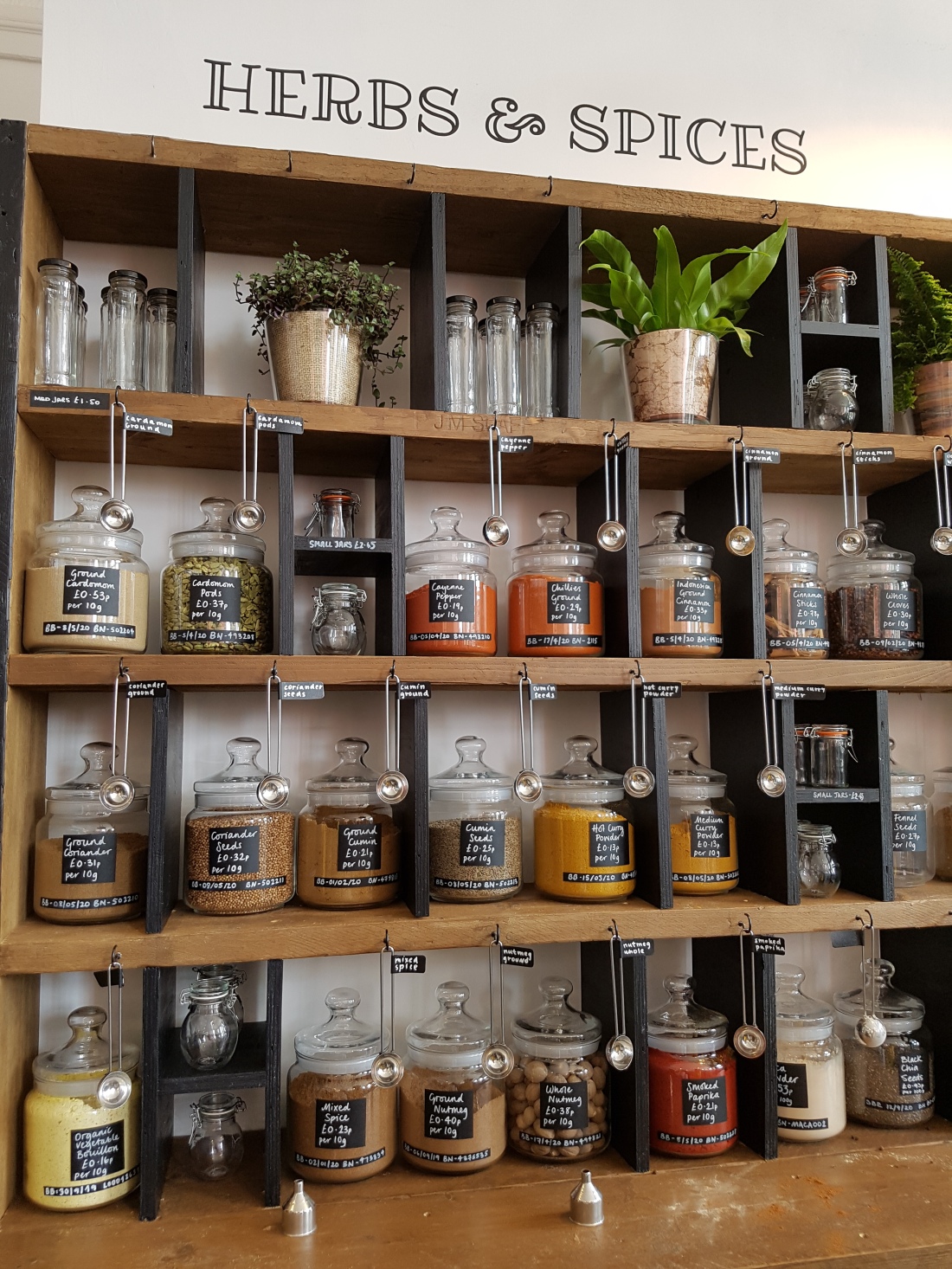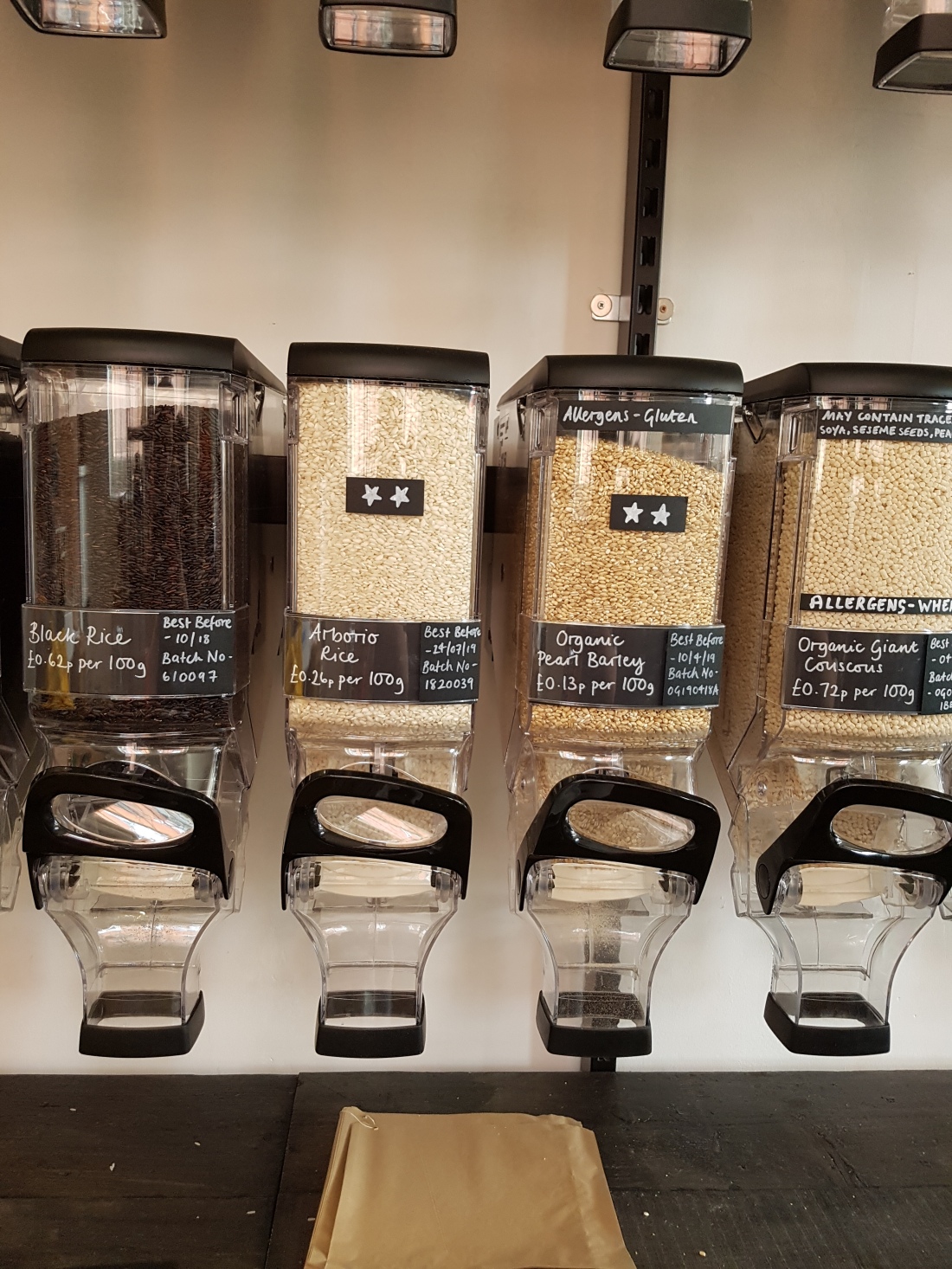Zero waste shops are popping up all over the UK, and there’s a good reason for it. Shopping zero waste is infinitely better both for the environment and your back pocket.

Reducing Food Waste
There is currently a huge problem with food waste levels across the world. At every stage of the supply chain, there is some level of food waste, so let’s start at the very bottom: the producers.

Whether plant or animal based, once harvested the food is sorted and the poorer quality ingredients often get discarded. A good example of this is fruit and vegetables – nowadays we hear about ‘wonky veg’, which is marketed as the produce that would ordinarily have been thrown away due to being ‘inferior’ quality. A portion of this wastage is unavoidable, as it may be due to diseased or otherwise damaged goods. However, the waste caused by the cosmetic expectations of consumers is entirely avoidable.
During processing, many items could be damaged while being packaged, or more product than required could be trimmed off when making it suitable for a consumer market.
And finally, the ‘best before’ date often misleads consumers into thinking the goods are inedible after this date, meaning many products remain unsold. Supermarkets alleviate this waste by reducing goods at certain times of the day, known as ‘yellow sticker’ items, however not all of these reduced goods will sell. After this, the food is normally discarded regardless of whether it’s suitable for consumption. The law prohibits shops from continuing to offer products which have expired their use by date – while this protects both the business and the consumer, it contributes massively to the amount of food wasted. Some companies have recognised this such as Approved Food, and are doing their bit to reduce waste by offering short dated products at a discounted price for consumers. At home, consumers may have bought more than they planned to use, or it was an impulse purchase. Perhaps the food was not stored appropriately and therefore prematurely spoiled.
Zero waste shops eliminate this risk of food spoiling before it can be used. It is the most effective way of only buying what you need, and as long as your purchases are planned, your food waste will drop dramatically. Zero waste shopping is an incredibly effective way of making sure your food stays fresh because food can be stored in an airtight container from the outset. While you can buy prepackaged grains from the supermarket, it’s quite unlikely that you’d require 500g at a time and therefore the goods may sit in the open packet for longer than is considered safe. Not only that, but open packages rolling around in your cupboards can mean increased likelihood of spills! It’s true they can be transferred to an airtight container once opened, but when shopping from a bulk bin, they can be stored correctly straight away. This means food is less likely to spoil in your cupboards. Not only that, but should your food expire, you have the ability to buy less next time. This is very rarely an opportunity to be had at your typical supermarket, so often you have to choose between sacrificing the product or continuing to buy the food to just let it go to waste. And when it is possible, it comes at an extra cost due to the reduced portion.
Reducing Packaging
The beauty of zero waste shopping is all of your packaging is either reused or reuseable. You take your containers, jars and bottles from home to get them weighed, and then take them home filled with your shopping. Some shops will also have containers for sale for you to use if you find yourself caught short. The key here is that none of the containers are disposable. Supermarkets and food stores are plagued with unnecessary, un-recyclable plastic packaging. Check out these oranges which have had their natural packaging taken away and packed in plastic boxes instead.

The point of zero waste shopping is that NONE of the products have been prepackaged for your ‘convenience’. They are available in bins and dispensers, completely free of plastic and other materials that do not degrade.
Consider the products you currently cannot buy without packaging. Certain fruits and vegetables? Milk? Grains, legumes and other dry goods? Pasta? Rice? In other words, staples of most household cupboards and fridges. Imagine how relieving it could be to open your kitchen cupboard and be greeted by no plastic. It would certainly make organisation easier! It’s so easy to see what you have left as well, and when you should be looking to stock back up.
Saving Money
Consider how much money you waste alongside the food that gets wasted when it expires before it can be used. Reduced waste will automatically mean more money left at the end of the month.
It is much harder to impulse buy at a zero waste store, because you often arrive with exactly the number of containers for the goods you plan to buy. If you fancy those expensive chocolate covered berries, but you have no containers left, you have the choice of either buying another container at the store or going without. Therefore it’s much easier to resist all those temptations than if you were shopping at a supermarket.

In the zero waste shops that I’ve heard of at least, there is no subliminal marketing to tempt you to buy the latest offering from a big brand. In fact, there are very few big brands at all. As we all know, brands often come with a hefty price tag so this automatically makes zero waste shopping cheaper. There is also no competition between products, meaning your shopping trip is likely to be much quicker as you spend less time choosing between brands which actually have minimal difference between them!
You have much more flexibility with meal planning when you shop zero waste, because you can buy only as much of the ingredient as is required for the specific meal you’re planning. There’s a reduced need to factor in leftovers because any leftovers you have will be entirely on purpose and not just a byproduct of being forced to buy more of an ingredient.
People pay a premium for convenience, and many are happy to do so. Convenience means easy open, resealable packaging, pre cut goods and tins. Shopping zero waste is cheaper as you are not paying this extra cost for the convenience of having to dispose of the extra packaging when you get home. Think about your typical supermarket – is it cheaper to buy whole carrots, or pre cut, packaged carrots? The lack of packaging also reduces the cost overall as the process of packaging the products is cut from the supply chain. This is the same principle to how buying a 3kg bag of pasta is cheaper than a 500g bag – economies of scale.

Photo by paul morris on Unsplash
Zero waste shops will purchase huge wholesale packages of the goods at a discounted price, compared to buying the individual packages you’d find in a supermarket. They can then pass this reduced price onto the consumer, resulting in many items actually being cheaper to buy from a zero waste store at any scale. There is no comparing price per 100g between packages of multiple sizes as there are no packages at all, only the containers you brought with you from home.
It is so much easier to compare prices across products as well, because all prices are in a standard format and one glance tells you what ingredients are the cheapest.

There are so many reasons why zero waste shopping should be the priority for everyone. Have a look and see if a zero waste shop is opening near you soon, and pop in and experience the best way to shop for yourself. Don’t just take my word for it!